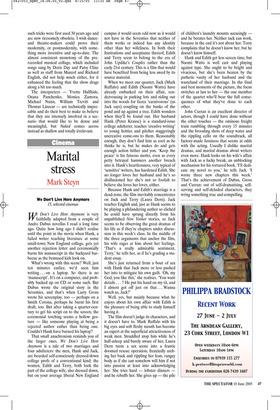Marital stress
Mark Steyn
We Don’t Live Here Anymore 15, selected cinemas We Don’t Live Here Anymore is very faithfully adapted from a couple of Andre Dubus novellas I read a long time ago. Quite how long ago I didn’t realise until the point in the movie when Hank, a failed writer teaching literature at some small-town New England college, gets yet another rejection letter and ceremonially burns his manuscript in the backyard barbecue as the bemused kids look on.
What’s wrong with this scene? Well, just ten minutes earlier, we’d seen him writing ... on a laptop. So there is no ‘manuscript’. It’s on a computer, and probably backed up on CD or some such. But Dubus wrote the original story in the Seventies, and that’s when Larry Gross wrote his screenplay, too — perhaps on a Smith Corona, perhaps he burnt his first draft, too. But after taking a quarter-century to get his script on to the screen, the ceremonial torching seems a hollow gesture — like someone playing at being a rejected author rather than being one. Couldn’t Hank have burned his laptop?
That small anachronism reminds you of the larger ones. We Don’t Live Here Anymore is a tale of two marriages and four adulterers: the men, Hank and Jack, are bearded self-consciously dressed-down college profs of a conventional kind; the women, Edith and Terry, both look the part of the college wife, also dressed down, but on your average liberal New England campus it would seem odd now as it would not have in the Seventies that neither of them works or indeed has any identity other than her wifeliness. In both their frustrations and acceptance thereof, Edith and Terry seem to belong to the era of John Updike’s Couples rather than the early 21st century. This is a film that would have benefited from being less awed by its source material.
When we meet our quartet, Jack (Mark Ruffalo) and Edith (Naomi Watts) have already embarked on their affair, rendezvousing in parking lots and riding out into the woods for fierce ‘carnivorous’ (as Jack says) coupling on the banks of the pond and up against a tree. Edith wonders when they’ll be found out. Her husband Hank (Peter Krause) is a standard-issue college adulterer, teaches ‘creative writing’ to young hotties and pitches staggeringly uncreative come-ons to them. Reasonably enough, they don’t find him as cool as he thinks he is, but he makes do and gets enough action hither and yon. ‘Keep the peace’ is his fatuous motto, even as every petty betrayal hammers another breach into it. Hank’s heartlessness, very typical of ‘sensitive’ writers, has hardened Edith. She no longer loves her husband and he’s so disillusioned her she’s not so foolish to believe she loves her lover, either.
Because Hank and Edith’s marriage is a dead-zone, the film inevitably concentrates on Jack and Terry (Laura Dern). Jack teaches English and, just as Hank seems to be playing a philandering author so clichéd he could have sprung directly from his unpublished New Yorker stories, so Jack seems to be observing the great dramas of his life as if they’re chapters under discussion in this week’s class. In the middle of the three arguments that anchor the film, his wife rages at him about her feelings. ‘That’s a really admirable sentiment, Terry,’ he tells her, as if he’s grading a student essay.
She’s just returned from a bout of sex with Hank that Jack more or less pushed her into to mitigate his own guilt. ‘Oh, my God, you like this,’ she realises. ‘You want details ... ? He put his hand on my tit, and I almost got off just on that ... Wanna watch us, Jack?’ Well, yes, but mainly because what he enjoys about his own affair with Edith is the pleasure of being able to study himself having it.
The film doesn’t judge its characters, and it doesn’t have to. Mark Ruffalo with his big eyes and soft fleshy mouth has become an expert at the superficial attractiveness of weak men. Straddled atop him while he’s half-asleep and barely aware of her, Laura Dern turns a sex scene into a frantic doomed rescue operation, frenziedly arching her back and rippling her lean, rangey body as if she can somehow will him if not into passion at least into acknowledging her. She tries hard — lobster dinners and he rebuffs her. She gives up — the pile of children’s laundry mounts accusingly and he berates her. Neither tack can work, because in the end it’s not about her. Terry complains that he doesn’t know her, but he doesn’t know himself.
Hank and Edith get less screen time, but Naomi Watts is well cast and playing against type. She ought to be bright and vivacious, but she’s been beaten by the pathetic vanity of her husband and the wasteland of their marriage. In the final and best moments of the picture, the focus switches at last to her — the one member of the quartet who’ll bear the full consequences of what they’ve done to each other.
John Curran is an excellent director of actors, though I could have done without the other touches — the ominous freight train rumbling through every 15 minutes and the brooding shots of deep water and the rippling cello on the soundtrack, all factory-made fussiness that seems at odds with the acting. Usually I dislike marital dramas, and marital dramas about writers even more. Hank looks on his wife’s affair with Jack as a lucky break, an unblocking mechanism for his tortured book. ‘I’ll dedicate my novel to you,’ he tells Jack. ‘I wrote three new chapters this week.’ That’s the achievement of Dubus, Gross and Curran: out of self-dramatising, selfserving and self-deluded characters, they wring something true and compelling.
















































 Previous page
Previous page